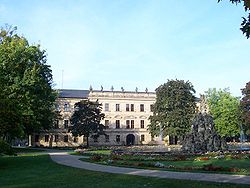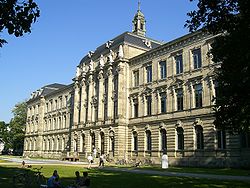
Friedrich-Alexander-University, Erlangen-Nuremberg
Encyclopedia


University
A university is an institution of higher education and research, which grants academic degrees in a variety of subjects. A university is an organisation that provides both undergraduate education and postgraduate education...
in the cities of Erlangen
Erlangen
Erlangen is a Middle Franconian city in Bavaria, Germany. It is located at the confluence of the river Regnitz and its large tributary, the Untere Schwabach.Erlangen has more than 100,000 inhabitants....
and Nuremberg
Nuremberg
Nuremberg[p] is a city in the German state of Bavaria, in the administrative region of Middle Franconia. Situated on the Pegnitz river and the Rhine–Main–Danube Canal, it is located about north of Munich and is Franconia's largest city. The population is 505,664...
in Bavaria
Bavaria
Bavaria, formally the Free State of Bavaria is a state of Germany, located in the southeast of Germany. With an area of , it is the largest state by area, forming almost 20% of the total land area of Germany...
, Germany
Germany
Germany , officially the Federal Republic of Germany , is a federal parliamentary republic in Europe. The country consists of 16 states while the capital and largest city is Berlin. Germany covers an area of 357,021 km2 and has a largely temperate seasonal climate...
. It is the second largest state university in Bavaria
Bavaria
Bavaria, formally the Free State of Bavaria is a state of Germany, located in the southeast of Germany. With an area of , it is the largest state by area, forming almost 20% of the total land area of Germany...
, having five Schools, 308 chairs, and 12,000 employees. There are 28,735 students enrolled (winter semester 2010/2011) at the university, of which about 2/3 are in Erlangen and 1/3 in Nuremberg. There are about 2,500 foreign students.
History
The university was founded in 1742 in Bayreuth by Frederick, Margrave of Brandenburg-BayreuthFrederick, Margrave of Brandenburg-Bayreuth
Frederick, Margrave of Brandenburg-Bayreuth , was a member of the House of Hohenzollern and Margrave of Brandenburg-Bayreuth....
, and moved to Erlangen in 1743. Christian Frederick Charles Alexander, Margrave of Brandenburg-Ansbach
Christian Frederick Charles Alexander, Margrave of Brandenburg-Ansbach
Christian Frederick Charles Alexander was the last Margrave of the two Franconian principalities Brandenburg-Ansbach and Brandenburg-Bayreuth, which he sold to the King of Prussia, a fellow member of the House of Hohenzollern.-Life:His parents were Charles William...
(one of the two namesakes of the institution) provided significant support to the early university.
From the beginning, the university was a Protestant institution, but it slowly secularized. During the Nazi era
Nazi Germany
Nazi Germany , also known as the Third Reich , but officially called German Reich from 1933 to 1943 and Greater German Reich from 26 June 1943 onward, is the name commonly used to refer to the state of Germany from 1933 to 1945, when it was a totalitarian dictatorship ruled by...
, the university was one of the first that had a majority of Nazi supporters in the student council. In 1961 the business college in Nuremberg was merged with the university in Erlangen, which led to the present state of a university divided between two towns. A technical faculty was inaugurated in 1966 and the pedagogical college in Nuremberg became part of the university in 1972.
Schools
In February 2007 the senate of the university decided upon a restructuring into five faculties http://www.uni-erlangen.de/infocenter/presse/pressemitteilungen/2007/nachrichten_2007/02_07/25grundordnung.shtml. Since October 2007 the FAU consists of:- School of Humanities and Social Sciences, School of Theology
- Law School, School of Business and Economics
- Medical School
- School of Sciences
- School of Engineering
The following faculties were part of the university:
(sorted in the order in which they were founded)
- Theological faculty
- Law faculty
- Medical faculty
- Philosophical faculty I (philosophyPhilosophyPhilosophy is the study of general and fundamental problems, such as those connected with existence, knowledge, values, reason, mind, and language. Philosophy is distinguished from other ways of addressing such problems by its critical, generally systematic approach and its reliance on rational...
, historyHistoryHistory is the discovery, collection, organization, and presentation of information about past events. History can also mean the period of time after writing was invented. Scholars who write about history are called historians...
, and social sciencesSocial sciencesSocial science is the field of study concerned with society. "Social science" is commonly used as an umbrella term to refer to a plurality of fields outside of the natural sciences usually exclusive of the administrative or managerial sciences...
) - Philosophical Faculty II (languages and literature)
- Science faculty I (mathematicsMathematicsMathematics is the study of quantity, space, structure, and change. Mathematicians seek out patterns and formulate new conjectures. Mathematicians resolve the truth or falsity of conjectures by mathematical proofs, which are arguments sufficient to convince other mathematicians of their validity...
and physicsPhysicsPhysics is a natural science that involves the study of matter and its motion through spacetime, along with related concepts such as energy and force. More broadly, it is the general analysis of nature, conducted in order to understand how the universe behaves.Physics is one of the oldest academic...
) - Science faculty II (biologyBiologyBiology is a natural science concerned with the study of life and living organisms, including their structure, function, growth, origin, evolution, distribution, and taxonomy. Biology is a vast subject containing many subdivisions, topics, and disciplines...
, chemistryChemistryChemistry is the science of matter, especially its chemical reactions, but also its composition, structure and properties. Chemistry is concerned with atoms and their interactions with other atoms, and particularly with the properties of chemical bonds....
, and pharmaceuticsPharmaceuticsPharmaceutics is the discipline of pharmacy that deals with all facets of the process of turning a new chemical entity into a medication able to be safely and effectively used by patients in the community. Pharmaceutics is the science of dosage form design...
) - Science faculty III (geographyGeographyGeography is the science that studies the lands, features, inhabitants, and phenomena of Earth. A literal translation would be "to describe or write about the Earth". The first person to use the word "geography" was Eratosthenes...
, geologyGeologyGeology is the science comprising the study of solid Earth, the rocks of which it is composed, and the processes by which it evolves. Geology gives insight into the history of the Earth, as it provides the primary evidence for plate tectonics, the evolutionary history of life, and past climates...
/ mineralogyMineralogyMineralogy is the study of chemistry, crystal structure, and physical properties of minerals. Specific studies within mineralogy include the processes of mineral origin and formation, classification of minerals, their geographical distribution, as well as their utilization.-History:Early writing...
/paleontologyPaleontologyPaleontology "old, ancient", ὄν, ὀντ- "being, creature", and λόγος "speech, thought") is the study of prehistoric life. It includes the study of fossils to determine organisms' evolution and interactions with each other and their environments...
) - Business- and social sciences faculty (1961) in Nuremberg
- Technical Faculty (1966)
- Pedagogical faculty (1972) in Nuremberg
Famous students and graduates
- Johann Christian Daniel von SchreberJohann Christian Daniel von SchreberJohann Christian Daniel von Schreber , often styled I.C.D. von Schreber, was a German naturalist.-Career:He was elected Professor of Materia medica at the University of Erlangen in 1769....
(1739–1810), naturalist, studied mammals. - Samuel HahnemannSamuel HahnemannChristian Friedrich Samuel Hahnemann was a German physician, known for creating an alternative form of medicine called homeopathy.- Early life :Christian Friedrich Samuel Hahnemann was born in Meissen, Saxony near Dresden...
(1755-1843), founder of homeopathyHomeopathyHomeopathy is a form of alternative medicine in which practitioners claim to treat patients using highly diluted preparations that are believed to cause healthy people to exhibit symptoms that are similar to those exhibited by the patient... - Georg Simon Ohm (1789–1854), physicist, Ohm's lawOhm's lawOhm's law states that the current through a conductor between two points is directly proportional to the potential difference across the two points...
, named after him. - Justus von LiebigJustus von LiebigJustus von Liebig was a German chemist who made major contributions to agricultural and biological chemistry, and worked on the organization of organic chemistry. As a professor, he devised the modern laboratory-oriented teaching method, and for such innovations, he is regarded as one of the...
(1803–1873), chemist, "father of the fertilizerFertilizerFertilizer is any organic or inorganic material of natural or synthetic origin that is added to a soil to supply one or more plant nutrients essential to the growth of plants. A recent assessment found that about 40 to 60% of crop yields are attributable to commercial fertilizer use...
industry". - Ludwig Andreas FeuerbachLudwig Andreas FeuerbachLudwig Andreas von Feuerbach was a German philosopher and anthropologist. He was the fourth son of the eminent jurist Paul Johann Anselm Ritter von Feuerbach, brother of mathematician Karl Wilhelm Feuerbach and uncle of painter Anselm Feuerbach...
(1804–1872), philosopher, associated with the Young HegeliansYoung HegeliansThe Young Hegelians, or Left Hegelians, were a group of Prussian intellectuals who in the decade or so after the death of Hegel in 1831, wrote and responded to his ambiguous legacy...
, an atheist. - Eduard BuchnerEduard BuchnerEduard Buchner was a German chemist and zymologist, awarded with the 1907 Nobel Prize in Chemistry thanks to his work on fermentation.-Early years:...
(1860-1917), chemist, Nobel Prize in ChemistryNobel Prize in ChemistryThe Nobel Prize in Chemistry is awarded annually by the Royal Swedish Academy of Sciences to scientists in the various fields of chemistry. It is one of the five Nobel Prizes established by the will of Alfred Nobel in 1895, awarded for outstanding contributions in chemistry, physics, literature,...
1907 - Emmy NoetherEmmy NoetherAmalie Emmy Noether was an influential German mathematician known for her groundbreaking contributions to abstract algebra and theoretical physics. Described by David Hilbert, Albert Einstein and others as the most important woman in the history of mathematics, she revolutionized the theories of...
(1882–1935), mathematician, Noether's theoremNoether's theoremNoether's theorem states that any differentiable symmetry of the action of a physical system has a corresponding conservation law. The theorem was proved by German mathematician Emmy Noether in 1915 and published in 1918...
, named after her. - Hans Geiger (1882-1945), physicist, Geiger counterGeiger counterA Geiger counter, also called a Geiger–Müller counter, is a type of particle detector that measures ionizing radiation. They detect the emission of nuclear radiation: alpha particles, beta particles or gamma rays. A Geiger counter detects radiation by ionization produced in a low-pressure gas in a...
- Ludwig ErhardLudwig ErhardLudwig Wilhelm Erhard was a German politician affiliated with the CDU and Chancellor of West Germany from 1963 until 1966. He is notable for his leading role in German postwar economic reform and economic recovery , particularly in his role as Minister of Economics under Chancellor Konrad Adenauer...
(1897-1977), Chancellor of Germany 1963-1966 - Karlheinz BrandenburgKarlheinz BrandenburgKarlheinz Brandenburg is an audio engineer who has contributed to the audio compression format MPEG Audio Layer 3, more commonly known as MP3.- Biography :...
(1954–), audio engineer, developer of the MP3MP3MPEG-1 or MPEG-2 Audio Layer III, more commonly referred to as MP3, is a patented digital audio encoding format using a form of lossy data compression...
audio codecCodecA codec is a device or computer program capable of encoding or decoding a digital data stream or signal. The word codec is a portmanteau of "compressor-decompressor" or, more commonly, "coder-decoder"...
. - Alma AdamkienėAlma AdamkieneAlma Adamkienė is the wife of the President of Lithuania, Valdas Adamkus, and was First Lady during his terms. She also holds a United States citizenship....
(1927-), First Lady of Lithuania 1998-2009
See also
- List of early modern universities in Europe
- Recktenwald Prize
- Top Industrial Managers for EuropeTop Industrial Managers for EuropeTop Industrial Managers for Europe is a network of more than fifty engineering schools and faculties and technical universities....

